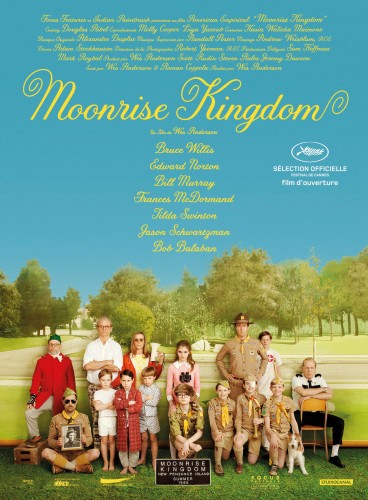 In seventeen years, Wes Anderson’s body of work has come to be identified by a specific, recurring set of the thematic interests and stylistic proclivities. His films contain deep-rooted traces of discontent and anger; his characters, whether they’re principal or secondary, carry parental (often paternal) chips on their shoulders and hail from families so dysfunctional that the label scarcely does them justice; he stages his mis-en-scene with the curated whimsy of a stage play. Yet despite his notoriety for maintaining a consistent aesthetic throughout his career and exploring the same concepts from picture to picture (but through different facets), it has taken Anderson nearly two decades to make a film that so effortlessly distills the essence of his cinema as his 2012 masterpiece, Moonrise Kingdom.
In seventeen years, Wes Anderson’s body of work has come to be identified by a specific, recurring set of the thematic interests and stylistic proclivities. His films contain deep-rooted traces of discontent and anger; his characters, whether they’re principal or secondary, carry parental (often paternal) chips on their shoulders and hail from families so dysfunctional that the label scarcely does them justice; he stages his mis-en-scene with the curated whimsy of a stage play. Yet despite his notoriety for maintaining a consistent aesthetic throughout his career and exploring the same concepts from picture to picture (but through different facets), it has taken Anderson nearly two decades to make a film that so effortlessly distills the essence of his cinema as his 2012 masterpiece, Moonrise Kingdom.
There’s an argument to be made that Moonrise Kingdom marks Anderson’s best film to date (and I’ll certainly support any arguments to that effect), but the more important point is that it’s his most essential. In fact, Moonrise Kingdom stands out as the primogenitor effort of Anderson’s entire filmography. While that claim may read as far-fetched given the picture’s comparative adolescence in relation to the rest of his oeuvre, it’s that precisely youthful characteristic that gives it a sense of formative authority over each of Anderson’s films that have preceded it– from the excellent Rushmore to the superbly forgettable The Darjeeling Limited, and everything that lies in between.
Consider the events and emotions which spark Moonrise Kingdom‘s central conflict. As with many of his films, Anderson starts with jaded, disaffected children and lets the consequences of their actions and feelings drive the narrative forward. In this case, however, those children are actually children, as opposed to children who have grown up and become bitter, cynical, maladjusted men and women (or, in some cases, bitter, cynical, maladjusted teenagers). Sam Shakusky and Suzy Bishop are both products of broken homes of very different persuasions; he’s a troubled veteran of the foster care system, she’s the eldest child in a family whose patriarch and matriarch hold very little love in reserve for one another. What else can Sam and Suzy do but collude and run away together, seeking idyl and solace in the wilds of New Penzance?
Put a different way, when Sam and Suzy fly the coop, their behavior reads as not only age-appropriate but surprisingly adult. Kids will be kids, after all, and their exodus from home– or, in Sam’s case, Camp Ivanhoe– represents classic children’s behavior. At the same time, Moonrise Kingdom takes great pains to convey the notion that they’ve based their decision on rationality rather than impulse. Sam and Suzy organize the entire operation carefully through a year’s worth of pen pal correspondence before enacting their master plan; they don’t hurriedly pack their bags and run off into the forest on a whim, and if the hermetic self-absorption of the Bishops and the bullying of the Khaki Scouts suggests anything, it’s that they flee for good reason.
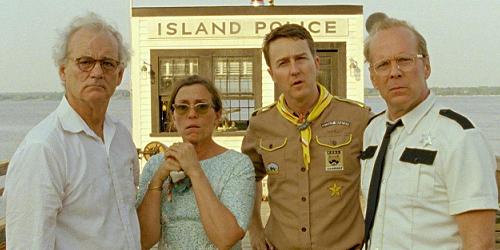
And, yes, eventually they’re caught and returned to the institutions they tried so hard to escape from. By the time Moonrise Kingdom ends, though, they’re reunited, but the tone of their relationship has altered and Anderson leaves it ambiguous as to whether the change is for the better. In their parting moment, as Sam scrambles out of Suzy’s window and into Captain Sharp’s waiting cruiser, we may be seeing the emergence of newfound maturity in their bond; alternately we may also be witnessing the first signs of waning love, and think back to a time when Suzy would have climbed after Sam and partaken in a new adventure with him. They’re already looking backward to a time when things between them were uncomplicated.
What we’re seeing in the film’s final beat is the fracturing of Sam’s and Suzy’s childish sincerity, which marks their transformation from naive children into grown-ups with hang-ups. It’s the instant in which we see them begin to turn into the Tenenbaum children; or perhaps the intractable, recalcitrant Max Fischer; or maybe even the quarrelsome, divided Whitman siblings. In other words, Moonrise Kingdom reads like the blueprint for nearly every movie Anderson has made since he emerged in the filmmaking world in 1996. It’s the film that shows us how the wonder and magic of childhood can abruptly end and give way to cynical, petulant adulthood.
The point, however, isn’t that Sam and Suzy are direct analogs for the characters which pepper Anderson’s narratives, or that Moonrise Kingdom presents the first time he’s ever shown us his characters’ childhoods. In The Royal Tenebaums, for example, we’re given glimpses of what life was like for Chas, Richie, and Margot growing up with Royal’s style of parenting; he shoots Chas in the hand with a BB gun and steals from him, constantly reminds people that Margot is adopted, and shows clear favor to Richie at Chas’s and Margot’s expense. And Anderson has dealt with child characters in his work before; Rushmore‘s Max is only fifteen years old when we meet him, and Fantastic Mr. Fox‘s Ash and Kristofferson are roughly the same age as Sam and Suzy.
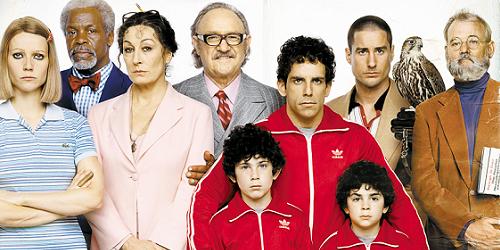
But the difference is that those characters have already transitioned from the pure period of childhood to an age of caustic, languid apathy. Sam and Suzy, for the emotional trauma they’ve endured up until they abscond together, haven’t made that leap just yet. They still have a chance at attaining the uncorrupt, simple love they so strongly believe to be possible, and Anderson has never shown us that before. Moonrise Kingdom is the first film of his career in which we see his principal characters in their truest, most unadulterated forms before life intervenes and splinters their naivete; unlike Tenenbaums or The Life Aquatic, where we arrive in media res respective to the characters’ malaise, we enter Sam’s and Suzy’s story prior to the loss of their innocence.
That lends a certain openness and frankness to Moonrise Kingdom that makes the rest of Anderson’s films more accessible. Certainly one might read its ending in a more positive, encouraging light, but Anderson lingers far too long on Sam’s painting, a recreation of the cove where he and Suzy made camp and played house, to be accidental– and though there’s a blunt quality to all of Anderson’s work, he has never been this open about how the wonders of childhood can be usurped by the difficulties of adulthood.
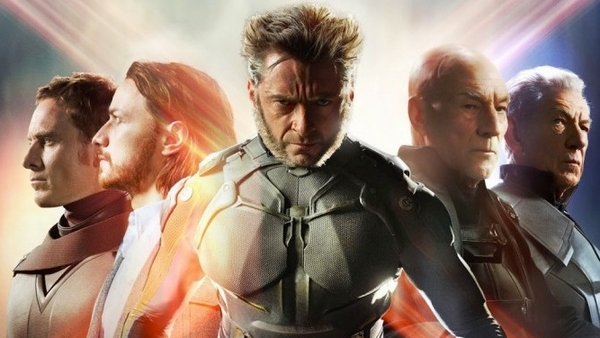

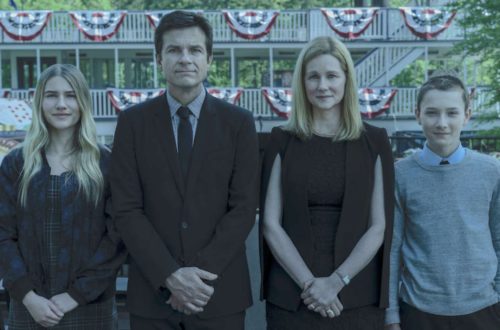
4 Comments
Dan Heaton
Excellent points, Andrew. Loved this post! I may be biased since Moonrise Kingdom was my favorite movie for 2012. I really hadn’t considered the slight melancholy of the final scenes and changes to the kid’s relationship. It felt like an upbeat resolution, particularly for Sam given his awful status in foster care. That said, I can see what you’re saying and not want to revisit it even more. Great job.
Andrew Crump
Thanks Dan– and I think the ending can be read either way, honestly, but I also think that Anderson focuses on Sam’s painting for a really specific reason. It’s bittersweet; things are objectively, outwardly “better” for both of them but their love has been diluted by the complexities of grown-up life. (And their relationship has definitely grown up over the course of the film.) Glad you liked the essay!
CastorTroy
Oh I wished I could be a child again, unburdened by responsibilities, cynicism and trauma. The youthful, innocent nature of Moonrise Kingdom is probably why I loved Moonrise Kingdom so much. Great post, sir.
Andrew Crump
Thanks, Castor. I think one of the great feats Anderson pulls off here is that he manages to take a wistful, nostalgic glance backward over his shoulder while also suggesting that said nostalgia can be kind of a trap. Sam’s and Suzy’s love, childlike and naive as it may be, is really sweet and tender and their time together does feel magical. But by the end of the film they’re already longing for that time again instead of looking forward.
It’s hard to walk that line but Anderson does it beautifully, and it’s the hidden complexity of the movie that makes me love it so much.